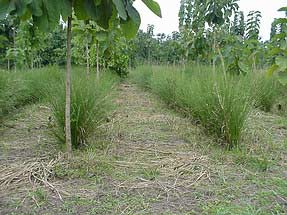Keep fertility for perennial crop land
Erosion is a common phenomenon in sloping areas with a heavy rainy season such as the South East and the Central Highlands. According to the Southern Institute of Agricultural Sciences, on the basalt slope land of cassava in Dong Nai, the amount of soil washed away by rain in 2 years is 51.38 tons / ha. So the amount of fertilizer every year will certainly be impervious to this loss. So on sloping land we should apply one of the following measures:

Vetiver grass for fencing is considered a very effective anti-erosion measure (Photo: biolcom.com)
- Planting carpet trees or soil storage measures to limit rain falling directly on the planted ground.
- Planting Vetiver grass as a fence is considered a very effective, easy and inexpensive anti-erosion measure because this grass has a hard stem that can block water flow and has very deep roots into the ground.
- Slow down the flow rate by reducing the slope length and reducing the slope.
- Enhance organic fertilizer or crop rotation to contribute to improving soil properties, increasing water permeability.
In order to exploit the maximum yield, care and fertilization of perennial crops is very important, but it should be noted:
- Chemical fertilizer effect is enhanced when proper and balanced fertilizer application. For example, when fertilizing excess nitrogen, less potassium will make plants decline resistance, susceptible to pests.
- Organic fertilizers, though not "loading" as chemical fertilizers, have the effect of improving the physical, chemical and biological properties of the soil, creating conditions for microorganisms in the soil to work, making soil porous, good water permeability. . On the other hand, in addition to the amount of nutrients N, P, and K, there is also a lot of micronutrients needed for plants such as Mg, Mn, Fe, Ca .
Among the perennial trees in the early years when the canopy is not closed, the soil must always be greened with secondary crops (Kudzu grass, hairy beans, beans, cat beans) or cover crops. The purpose is to prevent evaporation, to retain moisture, to prevent erosion, to wash away and to limit weed growth.
Weeds in orchards also adversely affect crops such as nutritional competition, water and are a place for local and harmful pests. Therefore, we must take measures to manage them, depending on the type of grass and the purpose of exploitation, people can use a rapid herbicide group such as Gramoxone or a group of radical herbicides such as Glyphosan. For perennial crops, people often use Glyphosat (Glyphosan) drugs for the following reasons:
- Drugs to eradicate roots of difficult-to-treat grasses such as grass, fine grass and bear grass.
- Dead grass stalks will rot to provide more humus, returning nutrients removed from the soil. At the same time, the grass roots when decomposing will create gaps to make the soil more clear and spongy naturally.
- The residual drug particles fall on the soil will be retained on the surface soil glue and will be decomposed into harmless substances should not affect the surrounding environment.
In order to use Glyphosan herbicide effectively, farmers should note:
- It is recommended to kill the grass before the fertilizer application in the year or when the grass has overgrown can affect the growth of the crop.
- When preparing the medicine, depending on the type of grass and the density of grass is thick or thin, farmers should choose the appropriate concentration and dosage. For example, with grasses mixed in 60 - 100 cc / 8 liters of water, use 5 - 6 liters / ha but for small grasses, only need 30-50 cc / 8 liters of water and use about 3 - 4 liter / ha.
- Africa increases crop yields through termites and ants
- Silicate rocks increase crop yields and limit CO2 emissions
- British scientists try to revive the pasture land
- A quarter of the world is degenerating
- Wi-Fi reduces fertility in men
- Perennial ice in the Arctic is disappearing
- To increase fertility in men
- Detection of 'stimulant' increases fertility
- Guess the fertility of men through the right hand
- The ability to test a man
- New method to increase crop yields
- Secondary forest - The key to reducing emissions
 'Barefoot engineer' invents a pipeless pump
'Barefoot engineer' invents a pipeless pump Process of handling dead pigs due to disease
Process of handling dead pigs due to disease Radiometer
Radiometer Warp Engine: Technology brings us closer to the speed of light
Warp Engine: Technology brings us closer to the speed of light